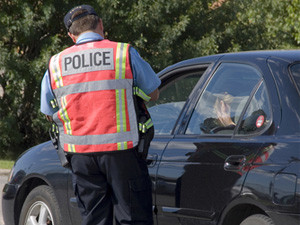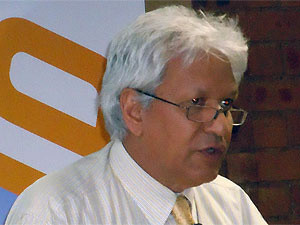
Those who decide against getting tagged when e-tolls come into effect in Gauteng could find themselves at the mercy of the courts, as they may face fines amounting to thousands of rands a month.
This is the view of Howard Dembovsky, chairman of the non-profit Justice Project SA (JPSA). He explains that the South African National Roads Agency's (Sanral's) intended use of the Criminal Procedure Act (CPA) means people who are not tagged and never received summons could also find themselves with criminal records.
Sanral has said it plans to use the CPA to prosecute those who do not stump up the fees within seven days. The draft regulations, which have yet to come into practice, say the agency may follow either criminal or civil processes to collect money.
As president Jacob Zuma has signed the e-toll Bill, or the Transport Laws and Related Matters Amendment Bill, into law, the regulations are one of the last steps before e-tolls can come into effect.
Transport minister Dipuo Peters now needs to proclaim when the law comes into effect, and publish the final tariffs and regulations for a minimum period of 14 days before e-tolls start.
Debt collection
Vusi Mona, GM of communications at Sanral, has said road users will have seven days from the first gantry pass to pay their e-toll transactions. "If the e-toll transaction is not paid within seven days, it is transferred to the violations processing centre (the section of e-toll operations that deals with overdue toll amounts)."

Mona said discounts will fall away when transactions are in the violations processing centre, and the alternative toll tariff will then apply. During this stage, transactions will be tallied and an invoice submitted to the road user, who will be given an opportunity to settle the amount payable and - depending on the time within which the fees are paid - post-grace period discounts might apply (another seven days).
If drivers do still not pay, a final demand will be sent out and the "issue handed over to the prosecuting authority", said Mona.
Flawed
Dembovsky explains that Sanral's use of the CPA means summons will have to be served. However, as process servers get between R27 and R38.50 for each summons that is served, there are instances in which the server claims it was served, even though the recipient refused to sign for it.

Under the CPA, summons must be served at someone's work or home address, but anyone over 16 can sign for it, says Dembovsky. However, because people refuse to sign and some servers are unscrupulous, delivery cannot be proven one way or the other, he notes.
This would lead to people failing to appear in court, and warrants of arrest being issued, says Dembovsky. He adds that the practice of non-delivery can be extrapolated through the amount of people who are arrested at roadblocks for unpaid speeding fines, as he cannot believe so many people would ignore a warrant.
Mona has said, as part of Sanral's enforcement strategy, "mobile units with traffic officers will be stationed at on- and off-ramps, and will also roam the Gauteng e-roads for enforcement of outstanding infringements".
Forty-nine gantries span Gauteng's highways. Toll fees are charged per overhead gantry passed, rather than the kilometres a vehicle travels. Each time a vehicle passes underneath a gantry, the toll fee is charged as a single transaction - with the cost per gantry being determined by the kilometre distance it represents.
Financial blackmail
Dembovsky says when people go to court, they will pay a fine for each gantry for which there is an outstanding fee. They will also have to pay a contempt of court fine if a warrant was issued.

Even if someone only drives under two gantries a day, this would amount to 80 a month, says Dembovsky. Although not yet clarified, he expects the fine to be around R250 for each gantry, taking the total criminal fine to R20 000.
In addition, says Dembovsky, motorists will face a R300 contempt of court fine, as well as a civil fine of R1 500. While it is not yet clear whether the civil fine will be applied to each offence, Dembovsky says that should be the case, as the civil fine cannot be applied differently to a criminal one.
He notes that, in the example of two tolls each way to work, a motorist would have to stump up R120 000 in civil fines for one month; or several hundred times the toll fee. This takes total fines to R140 300. "It is essentially financial blackmail."
In addition, Dembovsky points out, Mona has been saying motorists who end up being prosecuted under the CPA will also have a criminal record. This process is so unattractive that it forces motorists to concede there is only one choice: get tagged, he adds.
Outa chairperson Wayne Duvenage previously said the criminal justice system does not have the capacity to deal with a deluge of thousands of e-tolling cases per month. "We have maintained before and continue to state that e-tolling is unworkable and unenforceable."
Sanral CEO Nazir Alli yesterday told 702 Eye Witness News that it shouldn't be assumed that Gauteng is a lawless society.
"I think once people actually start to see and enjoy the actual benefits of the thing and recognise that it is a contribution that they are making to the upkeep of the infrastructure and paying for the service they are getting, people will pay," he told the radio station. "So I am not as pessimistic as most of the people around to say there will be widespread lawlessness. We are a law-abiding society in South Africa."
Department of Transport spokesman Tiyani Rikhotso was not immediately available this morning and Sanral had not reverted, after a request for comment, at the time of writing. It indicated the query was receiving its attention.
Share